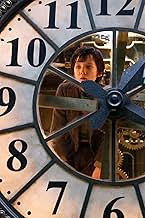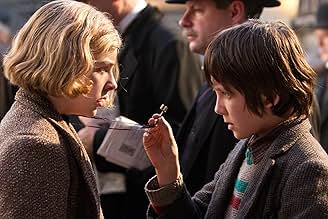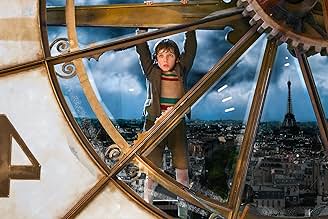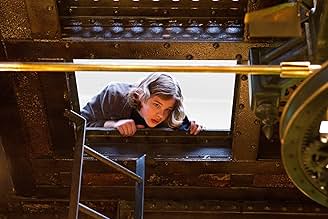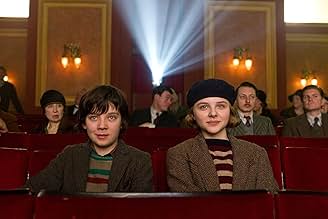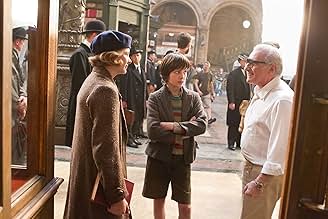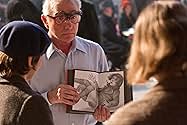Im Paris des Jahres 1931 wird der Waisenjunge Hugo Cabret, der in den Mauern eines Bahnhofs lebt, in das Geheimnis um seinen verstorbenen Vater und einen rätselhaften Automaten verwickelt.Im Paris des Jahres 1931 wird der Waisenjunge Hugo Cabret, der in den Mauern eines Bahnhofs lebt, in das Geheimnis um seinen verstorbenen Vater und einen rätselhaften Automaten verwickelt.Im Paris des Jahres 1931 wird der Waisenjunge Hugo Cabret, der in den Mauern eines Bahnhofs lebt, in das Geheimnis um seinen verstorbenen Vater und einen rätselhaften Automaten verwickelt.
- Regie
- Drehbuch
- Hauptbesetzung
- 5 Oscars gewonnen
- 61 Gewinne & 193 Nominierungen insgesamt
Empfohlene Bewertungen
However that is merely the framing for what is an ode to the earliest days of cinema, and in particular one of its true pioneers, Georges Melies. With references to "Arrival of a Train" – one of the world's first films by the Lumiere brothers, Melies's "A Trip to the Moon" and many others, this really is a treat for movie fans. Yes on a very basic level it is a children's movie, but really there's far more here for adults. Scorsese wonderfully juxtaposes his most technologically advanced film yet to demonstrate the genius and inventiveness of cinema in its earliest days.
There are fine performances from the two children, as well as Ben Kingsley as Melies and Sasha Baron Cohen as a determined and love struck station inspector. I actually thought that Helen McCrory stole the show as Melies' wife Mama Jeanne.
I never got to see Hugo in 3D, but the blu ray version looks truly sumptuous, with some breath taking imagery of early 20th century Paris. The film does tailor off significantly towards the end, with Scorsese seemingly unsure of what to do with the final act once the children had solved their mystery. What comes before is truly magical though and this film gets a big thumbs up from me.
Set in 1930's Paris, the main focus of this cinematic love is the work of the first movie magician, Georges Melies. We are introduced to Hugo (Asa Butterfield), a young man whose father left him a automaton after his death. It was a project that they worked on together, but never finished it. Hugo's main mission is to get the object working. As an orphan, Hugo hides in the rafters of a train station, maintaining the clocks that his drunken uncle used to do. After befriending a young girl, Isabelle (Chloe Moretz), he finally gets the automaton working, and it opens up a mystery that leads to the forgotten cinema of Melies (Ben Kingsley), now working on a store in the station.
The film shows love for silent cinema, and particularly the magic of Melies. Sacha Baron Cohen's station inspector is occasionally funny, and his character seems to be filtered through both Peter Sellers' Inspector Clouseau, and Jacques Tati's Monsieur Hulot, but he just doesn't seem to really progress at all, and feels almost like a filler character. Scorsese, like Robert Zemekis and Bob Gale before, reference that iconic Harold Lloyd moment in Safety Last! (1923), as Hugo hangs from a clock face.
Like so many others who speculate about the choices of Oscar nominations, Hugo, I feel, is not a contender for the best picture Oscar. There were some far better films produced in 2011. That said, the film is beautiful, accomplished , and often fun. Also, the resurgence of interest in a forgotten father of cinema, is completely touching, and leaves a warm feeling in the heart. Unfortunately, I did not see this in 3D; as far as I am aware, Scorsese uses it to brilliant degrees, so perhaps this would have made the experience perfect (despite the fact that I care not for the dimensions of 3.
www.the-wrath-of-blog.blogspot.com
Hugo is trying to fix an automaton, the only memorabilia he has from his father, stealing parts from the bitter and cranky owner of a toy store, Papa George (Ben Kingsley). However it is missing a heart-shaped key to make it work. Hugo believes that the robot possesses a last message from his father. When George holds Hugo, he takes a notebook from the boy with the notes that he is using to repair the automaton.
Hugo follows George and meets his granddaughter Isabelle (Chloë Grace Moretz), who is raised by her grandparents after the death of her parents. Isabelle befriends Hugo seeking to live the adventure of her life. When Hugo sees that the girl has the key that he needs, he brings her to his hideout and the automaton works and draws a poster from 1902 George Méliès' film "Le voyage dans la lune". Hugo and Isabelle continue to research about the filmmaker and they find a hidden secret about George Méliès.
"Hugo" is a wonder for any cinema lover, with a great tribute to George Méliès. Martin Scorcese delivers his best film after many years, with a wonderful story of a boy that fixes machinery and ends fixing the heart of an old man.
It is unbelievable that users without any cinema culture give low rating to a film that is a great homage to the silent movies, with many references along the story. The boy Asa Butterfield, from "The Boy in the Striped Pyjamas", gives another excellent performance and the girl Chloë Grace Moretz, who has a lovely smile, shows a fantastic chemistry with Asa Butterfield.
It is intriguing that at least three movies nominated to the Oscar 2012 have points in common: "The Artist" is a film about the transition from the silent movie to the spoken films; "Hugo" is set in Paris in the late 20's and has references to actors, actresses and directors of the silent movies; and "Midnight in Paris" is also set in Paris in the 20's. My vote is nine.
Title (Brazil): "A Invenção de Hugo Cabret" ("The Invention of Hugo Cabret")
Hugo's only link back to his late father is through a majestic mechanical automaton, a sort of tin man which his father had been restoring in his spare time. As appears to be the way with all tin men this one is also missing a heart, but this time it is a heart shaped key which Hugo is convinced if he can find will unlock the secrets inside. This leads young Hugo on a dangerous but adventurous search which often lands him in the clutches of either the local shopkeeper (Ben Kingsley) or the Station Inspector (Sacha Baron Cohen). Help is at hand though from the shopkeeper's god daughter Isabelle (Chloe Grace Moretz) and as the two join forces they soon discover they have more in common than they thought.
In Hugo, Scorsese has produced a truly magical tale which sucks the viewer into the screen via the innovative use of 3D so immersing us within the dynamics of Parisian life and the wonders that take place within the walls of the station. Butterfield is perfectly cast as young Hugo, a curious young boy determined to survive in a hard and cold world which constantly seems to deal him a bad hand; you simply can't help but love him. Moretz after a slightly shaky start soon finds her feet (and her accent), Kingsley is excellent, especially as the story develops and there is strength in depth from a top notch supporting cast including Emily Mortimer, Ray Winstone and Christopher Lee to name but a few.
Hugo's strength however is in its story, which effortlessly unfolds in front of you with real grace and elegance. Scorsese's love for the history of his craft and his desire to share this tale of early cinema is evident in every frame. Whilst it may not be the most historically accurate portrayal of cinematic history it has a true and good heart which beautifully captures the essence of what is cinema.
Some people have criticised Scorsese for creating a children's movie that is inaccessible for most children. I strongly disagree on this point. To me Hugo is a classic children's movie which works across all age spectrums, much in a similar vain to Spielberg's ET. In a world of Woody, Buzz, Jessie and meatballs that fall from the sky (which don't get me wrong are all fabulous in their own right), it is refreshing to see a children's movie of old. It feels like a magical Christmas movie to me, perfectly accessible and enjoyed by all.
Hugo is fully deserving of the many accolades that it picked up during the awards season. It is a wonderful and engaging film which I will show my children when they are a little older and I am certain they will fall in love with cinema in the same way their father need did so many years ago.
Review by Will Malone www.maloneonmovies.com
As I mentioned, this movie will only really appeal to certain people. Scorsese fans might be put off by the fact that this film is a family-friendly adventure; it doesn't exactly fall in line with Scorsese's usual subject matter. The family crowds will probably enjoy it, but younger children will likely be put off by it's slow pacing and lack of excitement. It's not so much an adventure as a journey of discovery, and little kids might not find themselves too involved in the story. My own daughter (4, going on 5) gave it an honest try when we sat down to watch it and made it 40 minutes or so before she fell asleep. Unfortunately, HUGO will probably be one of those films that fades into the background (if it hasn't already) and find most of it's loving coming from the film school crowds. The movie incorporates a loose interpretation of the life of Georges Méliès, a stage magician and an early innovator in world of cinema who realized the potential for the new medium of storytelling. At a time when most "movies" were just real-world situations recorded to celluloid (such as the famous train pulling into the station), Méliès created fantastic stories and mythical tales to entertain, filling his films with special effects and dramatic costuming. The movie focuses on the fact that so many of Méliès' films were lost over time and the tragedy of these classics from one of the earliest, most important filmmakers, ceasing to exist.
Scorsese makes his message perfectly clear in the final half of the movie, which happened to be my favorite part of the film. Ben Kingsley is Papa Georges (Méliès) and, in the film, he is a defeated man who mourns the death of his legacy following World War I. Kingsley is perfect here and the highlight of the movie. The children in the film, Asa Butterfield and Chloë Moretz, do a serviceable job but, as is usually the case with younger actors, their performances come off as forced and wooden most times. Even Moretz, who's performances I freakin' loved in KICK-ASS, doesn't feel real here. Maybe it's just that Scorsese isn't accustomed to working with younger talent and wasn't able to bring out the best in them, but it's a shame because the two of them are the key players in the movie. There's a handful of other minor roles filling out the film with talent: Christopher Lee, Ray Winstone, Jude Law, etc. My favorite would probably be Sascha Baron Cohen (yes, Borat) as the station inspector. With his Doberman patrolling by his side and the frame providing support for his bum leg, he was almost cartoonish. I loved him, and he was more than capable of toning down his usual eccentricity. HUGO is a movie with a lot to love, even more if you're a cinema snob. I really enjoyed it, but a slow first act and weak performances from the kids mean it's far from perfect. HUGO has my full recommendation for anyone who might want a glimpse into world of a true film-lover.
What Scorsese Film Ranks Highest on IMDb?
What Scorsese Film Ranks Highest on IMDb?
Wusstest du schon
- WissenswertesThe guitarist, who appeared early in the movie and at the Georges Méliès party near the end, was modeled after famed Belgian guitarist Django Reinhardt. The filmmakers even went so far as to have the actor's left-hand match Django's. He doesn't use his fourth and fifth fingers (which were burned in a fire).
- PatzerThe movie is set in 1931. From 1925 to 1934 the Eiffel Tower had illuminated signs for Citroën that adorned three of the tower's four sides. However, in the movie the lights on the tower are as they are today, with no Citroën sign on it.
- Zitate
Hugo Cabret: Maybe that's why a broken machine always makes me a little sad, because it isn't able to do what it was meant to do... Maybe it's the same with people. If you lose your purpose... it's like you're broken.
- Crazy CreditsThere is only one opening credit, the film's title, which does not appear until nearly 15 minutes into the film.
- Alternative VersionenThe UK, French, Italian, Swiss, Turkish and Middle Eastern versions have the Paramount Pictures logos and references to Paramount Pictures removed because the film was not distributed by Paramount in those territories.
- VerbindungenFeatured in Maltin on Movies: The Muppets (2011)
Top-Auswahl
Details
- Erscheinungsdatum
- Herkunftsländer
- Offizielle Standorte
- Sprache
- Auch bekannt als
- La invención de Hugo Cabret
- Drehorte
- Produktionsfirmen
- Weitere beteiligte Unternehmen bei IMDbPro anzeigen
Box Office
- Budget
- 150.000.000 $ (geschätzt)
- Bruttoertrag in den USA und Kanada
- 73.864.507 $
- Eröffnungswochenende in den USA und in Kanada
- 11.364.505 $
- 27. Nov. 2011
- Weltweiter Bruttoertrag
- 185.770.310 $
- Laufzeit
- 2 Std. 6 Min.(126 min)
- Farbe
- Sound-Mix
- Seitenverhältnis
- 1.85 : 1







